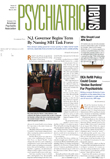Primary care physicians in New York City are beginning to use a brief questionnaire to screen for depression in what public health officials there hope will become a citywide effort.
Lloyd Sederer, M.D., executive deputy commissioner for mental hygiene in the city's Department of Health and Mental Hygiene, told Psychiatric News that a dozen or so primary care practices in the city have been enlisted in the effort so far.
But Sederer said he hopes that the practice will spread by example and as a result of leadership from the Department of Health and Mental Hygiene and from the New York City Health and Hospitals Corporation, which is cooperating with the effort. A fourth of the city's population receives its primary care at hospitals, Sederer said.
“This is an issue of disseminating medical innovation, which is done step by step,” he said. “At some point we will reach a tipping point, and our expectation is that regular screening for depression will become a routine practice in primary care.”
For now, the effort is focused on screening adults, but Sederer said that in time he would like to see routine screening extended to children and adolescents.
“Once we succeed with adults, we will turn to children and adolescents,” he said. “They too have mental disorders that are underdetected and undertreated.”
From 2000 to 2002, Sederer was director of what was then called the Division of Clinical Services at APA.
Screening will be done using the nine-item Patient Health Questionnaire (PHQ-9).
One question asks the respondent to indicate how often he or she has experienced nine symptoms of depression in the past two weeks, including having little interest in activities; feeling down, depressed, or hopeless; or having trouble sleeping. Respondents choose from one of four choices: not at all, several days, more than half the days, or nearly every day.
A second question asks respondents to rate how difficult these problems have made it to do work, take care of things at home, or get along with other people: not at all difficult, somewhat difficult, or extremely difficult.
Sederer said the instrument provides a quantitative assessment of the patient's depression, not different from the number that a primary care doctor attaches to a variety of other conditions that are routinely screened. A treatment algorithm outlines treatment options ranging from self-management techniques taught by the primary care physician to specialty referral for more severe or refractory cases.
“We chose this instrument because of how well established it is and because of its proven scientific foundation,” Sederer told Psychiatric News. “It attaches a number to the patient's condition, and we know the number goes down when someone gets better. So it's not just a screening tool, but a monitoring tool as well.”
Darrel Regier, M.D., executive director of the American Psychiatric Institute for Research and Education (APIRE) and director of APA's Division of Research, provided background information on the questionnaire. It was developed as part of the Primary Care Evaluation of Mental Disorders (known as PRIME-MD) diagnostic system by Robert Spitzer, M.D., and colleagues at Columbia University in collaboration with researchers at the Regenstrief Institute at Indiana University.
“The PHQ-9 has emerged as one of the leading methods for assisting both primary care physicians and psychiatrists to obtain a quantitative assessment of depression severity and treatment response,” Regier said.
He added that although Pfizer Pharmaceutical Co. holds the copyright on the instrument, the company has made it freely available to physicians for clinical practice and to other pharmaceutical companies for clinical trials. The instrument can be downloaded from<www.pfizer.com/phq-9>.
Regier said many other foundations and the federal government have tested this instrument extensively for the assessment of depression in primary care settings. It is also part of the MacArthur Foundation depression treatment toolkit posted at<www.depression-primarycare.org/images/pdf/macarthur-toolkit.pdf>.
“At the present, APIRE is working jointly with the American Academy of Family Physicians and the American College of Physicians to evaluate the potential for incorporating this instrument into the routine practice of primary care and psychiatric practice,” Regier said. “We are delighted to see the additional work that is being done with this instrument in New York City with the support of Lloyd Sederer in the Department of Health and Mental Hygiene.” ▪
